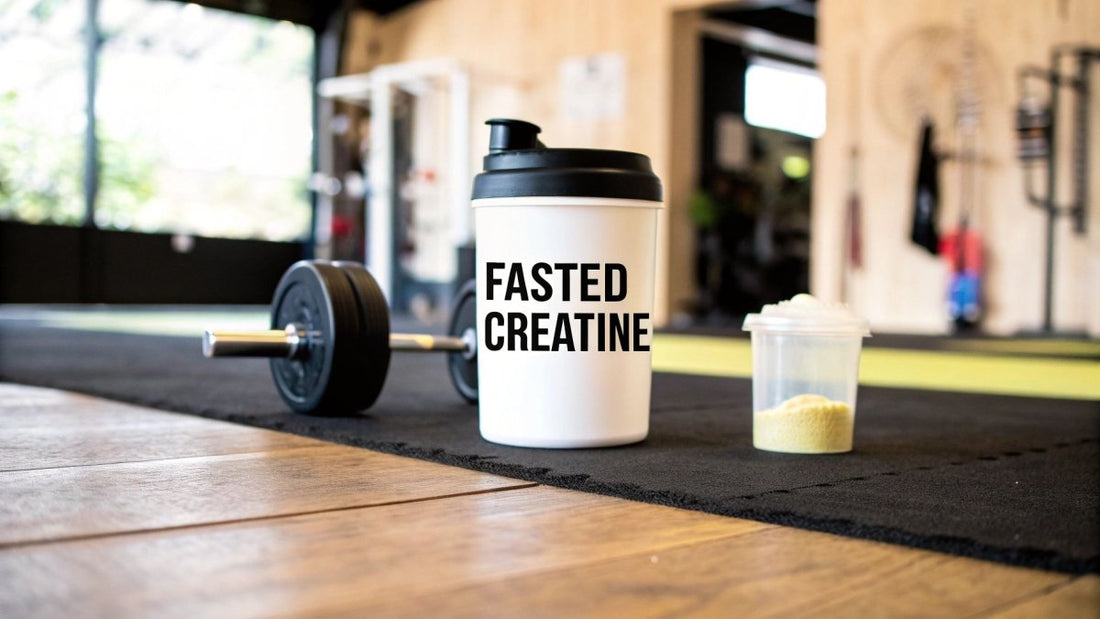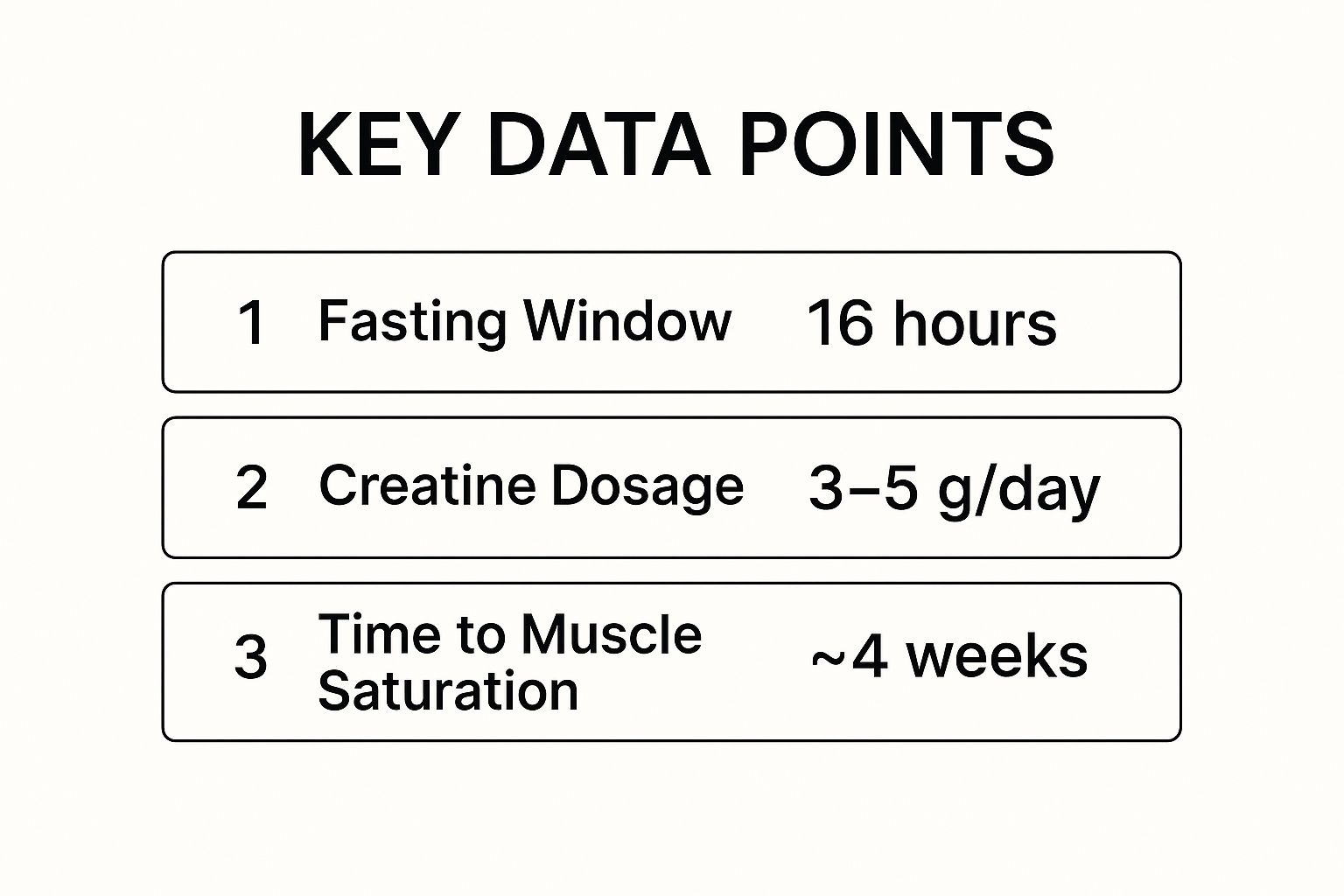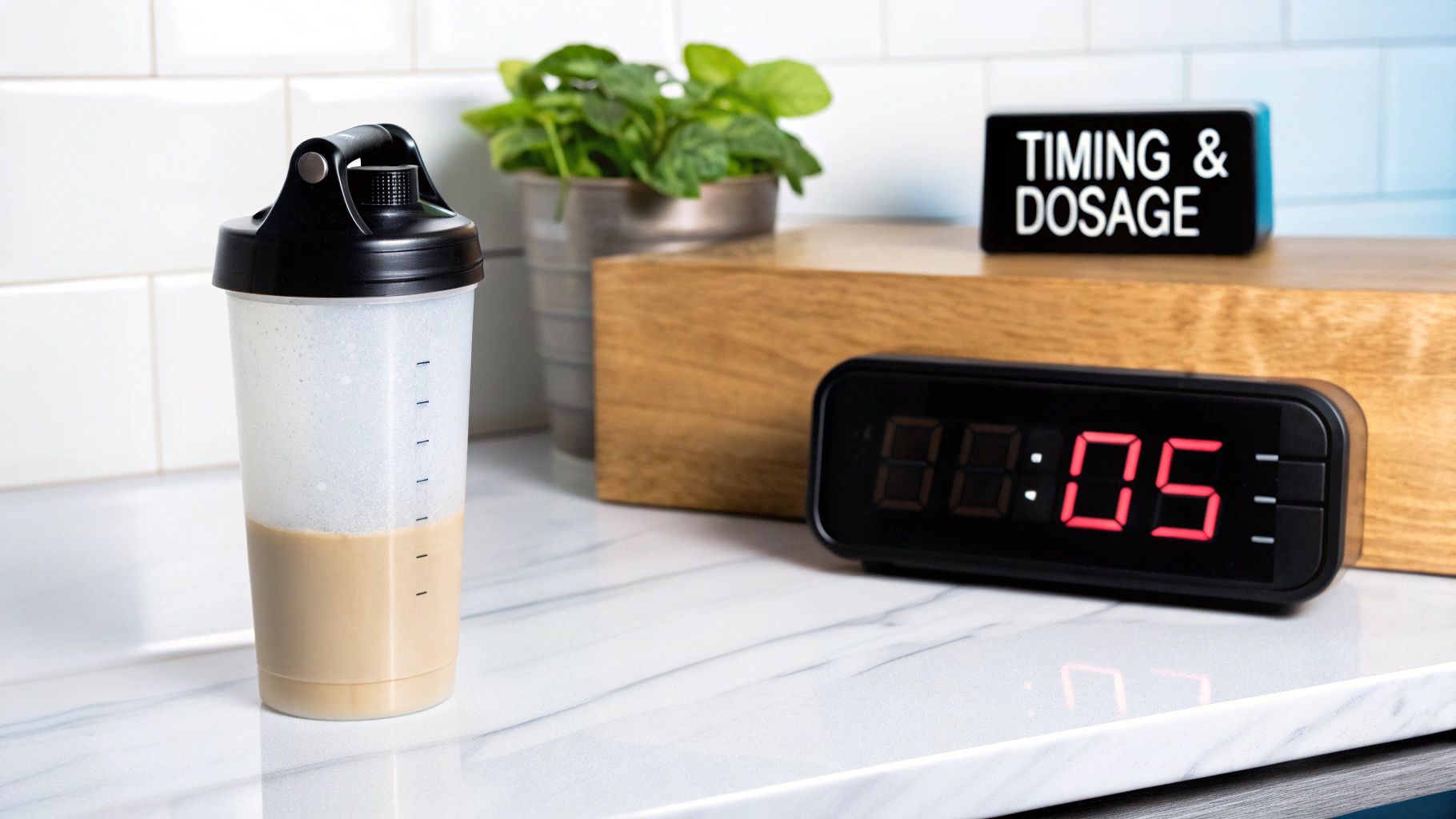
Creatine While Fasting: Benefits & Tips for Safe Use
Share
Yes, you can absolutely take creatine while fasting.
While a typical 3-5 gram scoop of creatine technically has a handful of calories, its actual impact on your metabolism is so small that it won't derail the main goals of intermittent fasting for most people, whether you're aiming for fat loss, better insulin control, or ketosis.
Understanding How Creatine Works During a Fast
A lot of athletes and fitness buffs mix creatine with fasting to hang onto hard-earned muscle and keep their performance up when cutting calories. The real question isn't about the calories themselves, but how your body reacts to the supplement. Does it cause an insulin spike big enough to break your fast?
For the vast majority of people, the answer is a firm no.
Pure creatine monohydrate—the kind without any added sugars or fillers—has a virtually nonexistent effect on blood sugar and insulin levels. You can think of it as a stealth supplement. It sneaks into your muscle cells to provide energy without setting off the metabolic alarms that would shut down processes like fat-burning or autophagy. This lets you get the benefits of both practices at the same time.
Aligning Creatine With Your Fasting Protocol
To get this right, you need to match your creatine plan to your specific fasting goals. What are you actually trying to accomplish with your fast?
- Protecting Muscle: Creatine is a powerhouse for preventing muscle breakdown (catabolism), which is always a risk during longer fasts or when you're in a significant calorie deficit.
- Maintaining Performance: It keeps your muscles fueled for intense workouts, which is especially helpful if you train in a fasted state and need that extra gear.
- Metabolic Health: If your fast is all about managing insulin or staying in deep ketosis, it's critical to use an unflavored, sugar-free creatine. Anything else could kick you out of your desired metabolic state.
The graphic below lays out the key details for successfully adding creatine to a fasting schedule, from proper dosage to how long it takes to fully saturate your muscles.

As you can see, a simple 3-5 gram daily dose is all you need. The real magic happens with consistent use over several weeks, which is what allows you to achieve optimal results.
Creatine Use Across Different Fasting Goals
The "right" way to use creatine can change depending on why you're fasting. This table breaks down how it fits with the most common fasting objectives.
| Fasting Goal | Does Creatine Interfere? | Key Recommendation |
|---|---|---|
| Weight Loss & Fat Burning | No | Take 3-5 grams daily to preserve muscle mass, which helps keep your metabolism elevated. |
| Autophagy & Cellular Repair | Minimal, but debatable | For strict autophagy, take creatine only within your eating window to be completely safe. |
| Ketosis & Blood Sugar Control | No (with pure creatine) | Always choose an unflavored, zero-carb creatine monohydrate to avoid any insulin response. |
| Religious or Spiritual Fasts | Depends on the rules | Adhere to the specific guidelines of your fast; some may prohibit all forms of consumption. |
Ultimately, for most health- and performance-related fasts, pure creatine is a safe and effective tool to keep in your arsenal. The key is to avoid any products with added sugars or carbohydrates that would disrupt your metabolic state.
How Creatine Powers Your Muscles

Before we jump into how creatine fits with fasting, it’s crucial to understand what it actually does in your body. At its core, creatine is all about delivering quick, explosive energy to your muscles. It's the fuel that helps you power through one last heavy rep or find that extra gear in a sprint.
Think of your muscle cells as having a small, built-in battery called adenosine triphosphate (ATP). This molecule is the direct energy currency for every single muscle contraction you make. The problem is, you only have enough ATP stored for a few seconds of all-out effort.
After that initial burst, your power would drop off a cliff. This is where creatine makes its grand entrance, acting as a high-speed charging station for those tiny ATP batteries.
The ATP-Creatine Phosphate System
Most of the creatine in your body is stored in your muscles as creatine phosphate. When you use up your ATP for energy, it loses a phosphate molecule and becomes adenosine diphosphate (ADP)—essentially a "dead" battery.
This is creatine's moment to shine. Creatine phosphate swoops in and donates its phosphate group to the drained ADP molecule, instantly recycling it back into a fully charged ATP battery, ready to go again.
This whole process is lightning-fast, letting your muscles sustain high-intensity work for much longer than they could on their own. It’s the primary energy source for anything lasting up to about 10 seconds.
By supercharging this rapid energy-recycling system, creatine supplementation directly enhances your strength, power, and performance in short-burst activities. It's one of the main reasons creatine is among the most proven and effective sports supplements on the market.
This powerful energy-boosting function is exactly why taking creatine while fasting can be a game-changer. When your overall calorie intake is low, making sure your muscles' immediate energy reserves are topped off can help you maintain workout intensity and preserve performance.
What This Means For Your Workouts
So, what does having more creatine phosphate in your muscles look like in the real world? It’s not just theory—it translates directly to better results you can see and feel in the gym.
When your muscles are fully saturated with creatine, you can expect:
- More Reps and Sets: You’ll be able to push through more total work before your muscles give out.
- Increased Strength: Study after study has shown significant bumps in strength and raw power output.
- Improved Muscle Growth: By helping you train harder and lift heavier, creatine provides a stronger stimulus for your muscles to grow. You can dive deeper into the science behind creatine for muscle growth in our detailed guide.
Getting a handle on this fundamental energy role is key. It sets the stage for understanding why it's so important to keep your creatine levels high, especially when you're combining it with a practice like intermittent fasting to protect your hard-earned muscle and gym performance.
Does Creatine Actually Break a Fast

This is the million-dollar question, isn't it? To get to the bottom of it, we have to look past a simple "yes" or "no" and figure out what "breaking a fast" really means to you. The answer changes depending on why you're fasting in the first place.
If you’re a purist and your fast means absolutely zero calories, then yes, creatine technically breaks it. A standard 5-gram scoop of creatine monohydrate usually has around 15 to 20 calories.
But let's be real—most of us are doing intermittent fasting for the metabolic perks, not just to hit zero on the calorie counter. For us, the better question is: does creatine mess with the very processes we're trying to activate, like keeping insulin low?
Calories vs. Metabolic Impact
When you're fasting for fat loss, better metabolic health, or to hang onto muscle, the tiny caloric hit from creatine is pretty much a non-issue. It's in the same ballpark as a splash of lemon juice in your water or a cup of black coffee. Both have a few calories, but they're widely accepted in fasting circles because they don't really move the needle metabolically.
Creatine works much the same way. It's made of amino acids, and like other proteins, it contains about four calories per gram. You'll often see "zero calories" on the label, but that's just a regulatory loophole that lets companies round down if a serving is under five calories.
While it technically breaks a zero-calorie fast, the good news is that its impact on your metabolism is almost nonexistent. Studies show that creatine by itself doesn't cause a meaningful insulin spike. That only tends to happen when you mix it with a big dose of sugar—something you're obviously avoiding during a fast.
This means a scoop of pure creatine isn't going to yank you out of your fat-burning state.
The bottom line is this: For anyone fasting to improve body composition and metabolic health, the handful of calories in creatine won't derail your efforts. It’s the lack of an insulin response that really counts.
Your Fasting Goals Dictate the Rules
Ultimately, whether you take creatine during your fast comes down to your personal philosophy and what you're trying to achieve. You need to be crystal clear on your goals.
Let's break it down:
-
If you're fasting for maximum autophagy: Autophagy is your body's cellular cleanup process. If this is your number one priority, the most conservative route is to stick with water only. In this scenario, you'd save your creatine for your eating window to keep things squeaky clean.
-
If you're fasting for performance and fat loss: For those of us focused on shedding fat, staying in ketosis, and keeping our strength up in the gym, taking creatine during a fast is generally considered a smart move. The benefits it offers for muscle preservation and power output easily outweigh the negligible calorie count.
Getting this distinction right is key. We dive deeper into this in our guide on whether creatine breaks a fast based on your goals. For most people, creatine is a powerful tool that works with their fast, not against it.
Creatine's Impact on Insulin and Ketosis

Calories aside, the real question for anyone who fasts is how a supplement will affect their key metabolic states—namely, insulin sensitivity and ketosis. Fasting is a fantastic way to keep insulin levels low, which is the signal your body needs to start burning stored fat for fuel.
Fortunately, pure creatine seems to play by the rules of fasting.
Think of insulin as a hormonal key. When you eat carbs, your blood sugar goes up, and insulin is released to unlock your cells and let the sugar in for energy. This process also firmly locks the door on your fat stores.
Creatine monohydrate, on its own, is different. It's more like a secret agent that can sneak into your muscles to do its job without needing a big insulin response to open the door. This means it can support your energy levels without disrupting the low-insulin state you've worked so hard to achieve.
Staying in Ketosis with Creatine
For those pairing intermittent fasting with a ketogenic diet, staying in ketosis is everything. This is the metabolic state where your body shifts from burning sugar to burning fat, producing ketones for fuel. Anything that spikes your insulin can slam the brakes on ketone production.
Since pure creatine doesn't really move the needle on insulin, it's highly unlikely to kick you out of ketosis. It lets you support your athletic performance without derailing the fat-adaptation process. It’s this exact synergy that makes taking creatine on keto such a popular strategy for maintaining strength and power.
By avoiding an insulin spike, pure creatine allows your body to continue producing ketones and burning fat for fuel, making it a compatible supplement for both intermittent fasting and ketogenic lifestyles.
This metabolic harmony is a game-changer. It means you can still fuel your muscles for those tough, high-intensity workouts—which can sometimes feel like a real slog during a fast—without sacrificing your primary goals.
The Hidden Danger of Additives
Here’s the most important takeaway: when taking creatine while fasting, purity is everything. The real threat to your fast isn't the creatine itself, but all the other stuff often mixed in with it.
Many creatine products, especially the flavored ones, are packed with sugars and carbs to make them taste better and dissolve easily. These additives are the real villains that will trigger a massive insulin spike, instantly break your fast, and shut down ketosis.
Here’s a quick list of what to watch out for on the label:
- Dextrose or Maltodextrin: These are basically simple sugars. They're often added to "spike" insulin for supposedly faster absorption—the exact opposite of what you want during a fast.
- Artificial Sweeteners: While most zero-calorie sweeteners are generally considered fine, some can still trigger a small insulin response in sensitive individuals. It's a bit of a gray area.
- BCAAs and Fillers: Some formulas bulk up their product with other amino acids or fillers that can add calories or have their own unique effects on your metabolism.
The bottom line? To use creatine while fasting safely, stick with an unflavored, pure creatine monohydrate with zero added ingredients. Always read the label. This one simple step ensures you get all the performance-boosting benefits without accidentally sabotaging all your hard work.
Protecting Your Muscle Gains During a Fast
So, we've established that you can take creatine while fasting. Now, let's get to the more important question: should you?
For most people, the number one reason to supplement with creatine during a fast is simple: to protect your hard-earned muscle. Think of it as an insurance policy for your gains when you're in a calorie deficit.
Fasting, by its very nature, is a catabolic state. That's just a scientific way of saying your body starts breaking down its own tissues for fuel. The big worry for anyone serious about fitness is that some of that fuel will come from your muscle. You didn't work that hard just to have your fasting routine eat away at your progress.
This is where creatine comes in. By keeping your muscle cells full of energy, it essentially sends a signal to your body: "Hey, this tissue is active and important. Let's not burn it for fuel."
Your Best Defense Against Muscle Breakdown
Taking creatine while fasting isn't just about preventing muscle loss; it's also about keeping your gym performance high. Let's face it, training on an empty stomach can sometimes feel like you're running on fumes. Creatine makes sure your immediate energy reserves are topped off, so you can still train with the intensity needed to keep your muscle.
It directly supports your strength and power, even when calories aren't coming in. This ensures your training sessions don't suffer, turning your fast into a powerful tool for fat loss without sacrificing your performance.
Don't just take my word for it. A massive 2023 meta-analysis showed a nearly six-fold improvement in muscle performance for people taking creatine compared to a placebo. One of the studies they reviewed was particularly interesting: active men saw a 4.5% jump in power output during sprints. They were able to generate more force, more quickly, without gassing out. You can dive deeper into these creatine performance findings yourself.
This performance boost is your strongest defense against the potential downsides of training in a fasted state.
How Creatine Becomes a Strategic Tool
Think of creatine as a way to bridge the gap between your fasting goals (like fat loss or autophagy) and your fitness goals (building or maintaining muscle). It helps you get the best of both worlds.
By preserving your muscle mass, creatine helps keep your metabolism humming. Muscle is metabolically active tissue, so protecting it is one of the best ways to ensure your body keeps burning calories efficiently, even while fasting.
Here’s a quick rundown of how it works for you:
- Sends an Anti-Catabolic Signal: It actively helps reduce the breakdown of muscle protein, telling your body to leave your muscle alone.
- Keeps Performance High: It gives you the fuel to lift heavy and train hard, which is the most powerful signal you can send to your body that your muscle is essential.
- Boosts Recovery: It helps keep your muscle cells hydrated and supports recovery, which is crucial when your body is under the stress of a fast.
At the end of the day, pairing creatine with fasting is a smart move for anyone looking to fine-tune their body composition. It helps you drop fat without having to worry that the lean muscle you've built is going along with it.
When Should You Take Creatine While Fasting?
Let's cut through the noise on one of the most overanalyzed topics in the fitness world: supplement timing. People can get really hung up on finding the "perfect" moment to take creatine, but honestly, the research all points to one simple truth: consistency matters far more than timing.
The real goal is to keep your muscles fully saturated with creatine.
Think of your muscles like a sponge. To keep it wet, you just need to add a little water to it every day. It doesn't really matter if you do it at 8 AM or 8 PM, as long as you do it consistently. Keeping that sponge—your muscles—topped up is what counts.
So whether you mix it in a glass of water during your fasting hours or take it with your first meal, the end result is the same. Your muscles will stay loaded and ready to perform.
Finding a Routine That Works for You
Forget chasing a "perfect" window. The best time to take creatine is simply the time you won't forget. Building that daily habit is what unlocks its long-term benefits.
Here are a few simple, no-stress ways to fit it into your day:
-
During Your Fasting Window: A scoop of 3-5 grams of pure creatine monohydrate with a glass of water is completely fine. It’s quick, easy, and won’t get in the way of your fast.
-
With Your First Meal: Prefer to take it with food? Go for it. This is a great choice if you find supplements can sometimes bother an empty stomach.
-
Around Your Workout: The whole pre- versus post-workout debate is mostly academic. The performance difference is so minimal it’s not worth stressing over. A comprehensive 2022 study on creatine timing confirmed that as long as you take it daily, it doesn't really matter if it's before or after you train.
The bottom line is simple: pick a time that slots effortlessly into your daily routine. The best plan is the one you can actually stick with, day in and day out. Don't let timing become a source of stress.
Answering Your Top Questions About Creatine and Fasting
When you're trying to pair creatine with a fasting routine, a few questions always seem to pop up. Getting these details right is key to making sure your supplement is helping, not hurting, your efforts. Let's clear up the confusion and tackle the most common concerns.
What’s the Best Type of Creatine to Use While Fasting?
When you're in a fasted state, the kind of creatine you choose really matters. The gold standard, without a doubt, is pure creatine monohydrate. It’s the most studied, proven, and cost-effective form you can buy.
The most important detail? It must be unflavored and contain zero added sugars, carbs, or other fillers. Those extras are what will trigger an insulin response and break your fast. Micronized creatine monohydrate is a great pick too, as it dissolves a bit better in water, which is handy when you aren't masking it in a shake.
The bottom line is simple: check the ingredients. If the label lists anything besides pure creatine monohydrate, it's a no-go for your fasting window. Purity is everything here.
Will I Get an Upset Stomach Taking Creatine on an Empty Stomach?
Most people handle a standard 3-5 gram dose of creatine in plain water just fine, even on a completely empty stomach. It's known for being incredibly well-tolerated.
That said, a small handful of people might feel some minor digestive grumbling. If that's you, don't worry. The solution is easy: just move your creatine dose to your first meal of the day. The real magic of creatine comes from consistent, daily use that keeps your muscles saturated, so shifting the timing to your eating window won't impact its effectiveness at all.
Can I Put Creatine in My Morning Coffee?
Yes, you absolutely can! This is a really popular and smart way to get your daily dose in. Mixing a scoop of unflavored creatine monohydrate into black coffee or unsweetened tea works perfectly.
Since neither black coffee nor plain tea has a meaningful effect on insulin or ketosis, they fit right into most fasting plans. The only catch is to avoid adding sugar, milk, or creamers, as those will add calories and carbs that break your fast. A scoop of pure creatine in your morning brew is a seamless way to stay on track.
Ready to make your creatine routine easier and tastier? Smash.com offers delicious creatine gummies that deliver your full 5-gram dose without the mess of powders. Perfect for your eating window or any time of day, they make staying consistent effortless. Check out our flavors at https://smash.com.